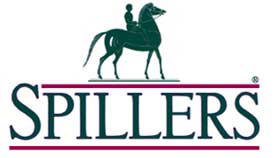
Feeding
Orphaned Foals
Feeding
Isabel Stewart BSc (Hons)
SPILLERS Nutritionist
No-one would wish this on anyone, but tragically,
this situation arises, necessitating emergency action to ensure
the foals survival without the mother.
The first aim is to find a surrogate mother, but failing that
foals can be reared successfully by hand.
Feed tactics
-
Colostrum: this, the so-called "first
milk" contains the essential antibodies necessary for
the foal to be able to develop a healthy immune system with
which to fight disease. The foal loses its ability to absorb
the immunoglobulins in colostrums within a few hours of
birth, and so it is essential to feed colostrum immediately
to prevent the foal succumbing to disease. If mares colostrum
is not available, then there are several commercially prepared
colostrums available.
-
Hygiene: cleanliness is next to godliness
with rearing foals, as they are susceptible to infection
and disease. Clean buckets, utensils and cleaned down housing
(preferably steam cleaned) are essential.
-
Train to suckle: the suckling reflex is
also lost early in the foals life, and must be established
within the first few days. Once a foal has learnt to suckle,
it can then be trained to drink from a bucket.
-
Feed frequently: Feed every 2 hours at
first, then expand to four hourly until the foal is about
a month old, then three times a day after that. Feeding
large amounts at once increases the likelihood of diarrhoea
or colic.
-
Follow manufacturers instructions: if using
a commercial milk replacer, use the correct proportion of
powder to water: 10-15% dry matter is the ideal; more concentrated
mixtures may cause constipation.
-
Make changes gradually: Increases in the
amount of milk offered should be made gradually. Solid feeds
such as milk pellets can be offered early on: foals can
and will eat about half a pound of such products in addition
to milk in their first 2 weeks of life, rising to 2lbs by
8 weeks. You can wean a foal around this time. Once weaned
a foal’s consumption of dry feed will increase rapidly
to 2-3 kg per day.
-
Don't spoil the foal: It is human nature
to overprotect, but the helpless little foal will soon tune
into a larger young horse. Foals accustomed to such privileges
as ad-lib titbits and treats, may become awkward to handle
when you subsequently wish to take a more disciplined approach
training.
Milk replacers
-
Mares milk replacer: in dried powdered
form ready for mixing: these are the preferred choice. However
if unavailable:
-
Cows and goats milk can be used but are
richer than mares milk and should be diluted 50:50 with
skimmed milk to achieve a similar nutritional content to
mares milk.
-
Milk pellets, based on cows milk are also
an alternative, providing high protein (20-25%) and high
fat (12-15%) for fuelling growth.
-
Calf milk replacers have been used successfully
in foals, and should contain at least 20% protein and 15%
fat.
-
Lambs milk replacers are less suitable
If you require any further advice on feeding your foal or
youngster please contact the SPILLERS careline on 01908 226626
or email: careline@spillers-feeds.com
SPILLERS Speciality Feeds Ltd
Old Wolverton Road
Old Wolverton
Milton Keynes
Buckinghamshire
MK12 5PZ
Tel: 01908 222888
Fax: 01908 222800
www.spillers-feeds.com
|
|
